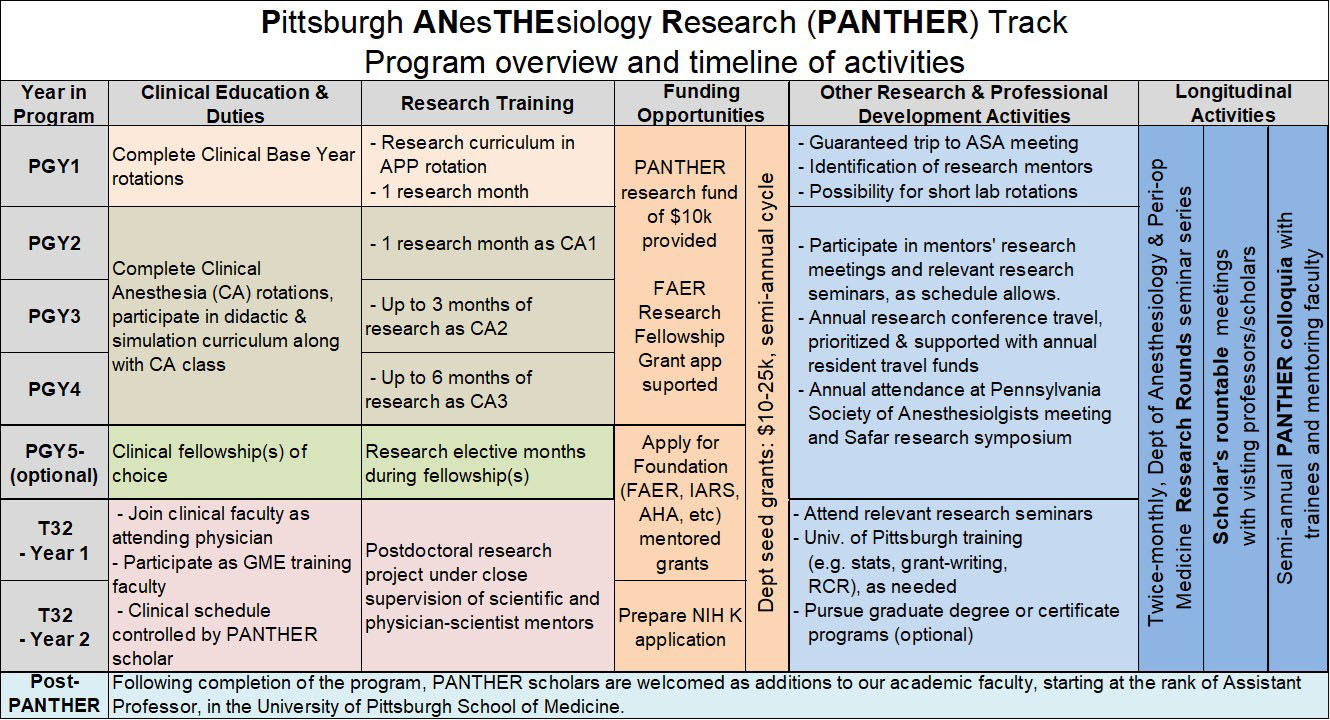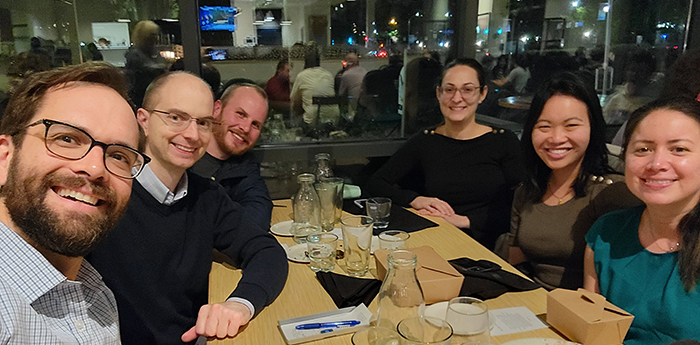The PANTHER track is an integrated training program for qualified residency applicants interested in pursuing an academic research career as a physician-scientist. This is a collaborative effort between UPMC Graduate Medical Education and the University of Pittsburgh School of Medicine, as PANTHER scholars move through the training pathway outlined in the timeline grid outlined below.

The PANTHER track director, Keith Vogt, MD, PhD, administers the PANTHER program in close coordination with the residency program leadership (Dr. Phil Adams, Program Director) and T32 program administration (Dr. Yan Xu, Program Director). This training pathway for physician scientists has the full support of departmental leadership. Additional information about the program can be obtained by emailing Dr. Vogt at any time in the application process.
PANTHER Track Description
Training Overview
PANTHER scholars participate in all the clinical and didactic programs that are the mainstay of our residency’s clinical training. Early exposure to ongoing research and departmental resources to support scholarly activity is introduced in the PGY-1 year as part of the APP rotation, including guaranteed attendance at the American Society of Anesthesiology annual meeting as a PGY-1. PANTHER scholars can schedule up to 11 months of research elective time, as allowed by the ABA and ACGME. This includes 1 month as a PGY-1, one month as a PGY-2, and 9 months spread over the PGY-3 and PGY-4 years. One or more clinical fellowships can be integrated into the PANTHER timeline for motivated scholars with a passion for subspecialty anesthesiology care. After completion of clinical training, PANTHER scholars are welcomed as clinical faculty at with at least 80% full-time effort protected for pursuing their research. Postdoctoral support for two years is provided by one of our department’s NIH T32 training grants. One important feature of this early career period is that PANTHER scholars have complete control over their clinical assignments, including clinical vs. research days, vacation, and call schedule.
Academic Development
Through regular interaction with other PANTHER scholars and research faculty, close advising is provided towards early selection of a research mentor during PGY-1. We strive to position our trainees to successfully compete for intra-mural and extramural grant opportunities during training. Scholars will be relieved from clinical duties to attend the department’s twice-monthly Research Rounds, which provide an engaging opportunity to interact with researchers within and outside UPMC and the University of Pittsburgh. PANTHER scholars will also regularly be involved in other local research meetings as their schedule allows. They will regularly meet with academic-track visiting scholars and visiting professors (invited speakers in our Grand Rounds and Research Rounds series) for roundtable discussion of research and other early-career academic issues. Priority in building the rotation block schedule will also accommodate any time-dependent research needs of the scholar. Additionally, PANTHER scholars, PANTHER track alumni, and mentoring faculty will participate in the semi-annual colloquium to provide focused and timely mentoring on all aspects of their academic career development.

Research Funding
In addition to the generous travel and expense funding provided to all anesthesiology residents, PANTHER scholars have access to $10,000 of research funding to support unmet needs in executing their individual projects. This is in addition to the department’s Fall & Spring Seed Grant program, which awards up to $25,000 per project per grant cycle in a competitive program.
Conference Travel
Each PANTHER scholar’s ability to attend and present research at professional meetings is given priority when creating monthly clinical (call) schedules to prevent conflicts. Presentations at the ANESTHESIOLOGY annual meeting, and the International Anesthesia Research Society (IARS) is encouraged. Annual attendance at the Pennsylvania Society of Anesthesiologists annual meeting and our local Safar Symposium is expected, and allows regular interfacing with trainee researchers outside our department.
PANTHER Track Application/Matching
Candidates should apply for the PANTHER track separately in ERAS using the identifying info “Anesthesiology – Research Track,” NRMP code 1652040C1.
Interested applicants should ALSO:
- Prepare a statement (approximately one page) of their research background, career plans, and interest specifically in the PANTHER track.
- This additional application material should be emailed directly to the PANTHER track Director.
- Deadline for receipt of this statement is October 1st each year.
During the residency interview season
Competitive applicants to the PANTHER program will be scheduled for a virtual program interview, and will additionally have one or more 1:1 meetings with the PANTHER track director.
Current PANTHER Scholars
Marianne Ligon, MD, PhD – residency class of 2026
Research Interests: Perioperative inflammatory-immune interactions
Alejandro Munoz-Valencia, MD, PhD – residency class of 2027
Research Interests: Global Transfusion Medicine
Anthony Cole, MD, PhD – residency class of 2028
Research Interests: Neurobiological mechanisms of anesthetic action, intraoperative monitoring, and brain state transitions occurring during induction and emergence.
Cooper Mellema, MD, PhD – residency class of 2028
Research Interests: Information theory, causal modeling, deep learning, signal processing
Funding Success: NIH F31 NS115348
Leon Su, MD, PhD – residency class of 2028
Research Interests: Regression analysis, machine learning, perioperative outcomes
Haani Jafri, MD, PhD - residency class of 2029
PANTHER Track Alumni Pursuing Research Careers
Brian Reon, MD, PhD – residency class of 2023
Current position: Assistant Professor, University of Virginia
Research Interests: Perioperative data mining, delerium
Michael Schnetz, MD, PhD – residency class of 2020
Current Positions: Assistant Professor, University of Pittsburgh; Coordinator of Data Sciences Research
Research Interests: perioperative data mining, machine learning, predictive systems, intraoperative hypotension
Andrea Ibarra, MD, MS – residency class of 2019
Current Position: Assistant Professor, University of Pittsburgh
Research Interests: health disparities in maternal and surgical outcomes, especially among those with cardiovascular disease
Funding Success: FAER MRTG, Bristol Myers Squibb Foundation, Diversity in Clinical Trials Career Development Program, SOAP/FAER MRTG
Jessica Cassavaugh, MD, PhD – residency class of 2017
Current Position: Clinical Instructor, Beth Israel Deaconess Medical Center
Research Interests: Estrogen, Hypoxia, Cardiovascular Disease, Women’s Health
Funding Success: FAER MRTG (current)
Keith Vogt, MD, PhD – residency class of 2015
Current Positions: Assistant Professor, University of Pittsburgh, Director Anesthesiology Neuroscience Research
Research Interests: functional neuroimaging, memory and pain processing under anesthesia, perioperative neurologic outcomes, experimental pain response
Funding Success: FAER MRTG; NIH K23 GM132755; R35 GM146822 (current), R01 MH132602 (Co-I)
Jim Ibinson, MD, PhD – residency class of 2010
Current Positions: Assistant Professor, University of Pittsburgh; Chief of Anesthesiology, VA Pittsburgh Health System
Research Interests: functional neuroimaging; perioperative neurocognitive disorders, perioperative pain
Funding Success: Veteran’s Health Administration competitive pilot program, Virginia Kaufman Endowment Fund, University of Pittsburgh Physicians Foundation, NIH R01AG063525 (Co-I), R01 NS096705 (Co-I)
Other PANTHER Track Mentoring Faculty at Pitt/UPMC
Senthil Sadhasivam, MD, MPH, MBA, FASA
Current Positions: Tenured Professor, University of Pittsburgh; Executive Vice Chair for Clinical Quality, Patient Safety, and Clinical Research, Director of Perioperative Research and Perioperative Genomics
Research Interests: Clinical opioid use: outcomes and safety, pharmacogenomics
Current Funding: NIH R01DA054513, R44 DA055407, R01 HD096800, R41 DA053877, U01 TR003719
Kimberly Howard-Quijano, MD, MS, FASE
Current Positions: Associate Professor, University of Pittsburgh; Associate Vice Chair for Research
Director of Translational Research, Academic Chief of Cardiac Anesthesiology
Research Interests: Neuraxial Modulation of Ventricular Arrhythmias - Mechanisms and Treatment
Funding Success: NIH K08 HL135418
K. Grace Lim, MD, MS
Prior Training: anesthesiology residency and obstetric anesthesiology fellowship, Northwestern University Feinberg School of Medicine; University of Pittsburgh T32 Postdoctoral Research Fellowship
University of Pittsburgh Institute for Clinical Research Education, Master of Science in Clinical Research, Comparative Effectiveness Track
Current Positions: Associate Professor, University of Pittsburgh; Chief, Division of Obstetric & Womens Anesthesiology; Magee-Womens Research Institute BIRCWH Scholar
Research Interests: obstetric anesthesia and perinatology; perinatal physiology, monitoring, and prediction; pain management in special populations
Funding Success: NIH K12 Career Development Award, CTSI Pain Research Challenge/Virginia Kaufman Award, CTSI Research Initiative for Special Populations, UPitt – UGC Precision Medicine Pilot Grants, Magee Womens Hospital Medical Staff Fund, University of Pittsburgh Physicians Foundation, NIH R01 MH134538, HEAL U24 NS115678 (Co-I), U54 DA049116 (Co-I), R41 DA053877 (Co-I)
Ben Alter, MD, PhD
Prior Training: Anesthesiology Research Track Residency (UCSF), UPMC Pain Medicine Fellowship, University of Pittsburgh T32 postdoctoral fellowship
Current Positions: Assistant Professor, University of Pittsburgh
Research Interests: chronic pain management, pain psychophysics, pain neuroimaging, endogenous analgesia
Funding Success: NIH K23 NS123429 (current), IARS-IMRA , FAER Research Fellowship Grant (at UCSF), NIH F30 NS061398, AAPM Early Investigator Research Grant, Virginia Kaufman Endowment Fund through the Pitt CTSI Pain Challenge, NIH U24 NS115708
Marsha Ritter-Jones, MD, PhD
Prior Training: Anesthesiology Residency, University of Wisconsin Hospital and Clinics; UPMC Regional Anesthesia and Acute Pain Fellowship; University of Pittsburgh T32 Postdoctoral Research Fellowship
Current Positions: Assistant Professor, University of Pittsburgh
Research Interests: understanding the role of nonpeptidergic neurons in the inflammatory response and pain; impact of regional anesthesia and perineural drug delivery on neural-immune communication.
Funding Success: NIH R35 GM150680 (current); FAER MRTG, Veteran’s Health Administration competitive pilot program grant
